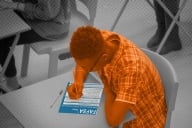You have /5 articles left.
Sign up for a free account or log in.
Last Monday I wrote my blog post during a snow day; today it’s 80F and sunny, and I’m on spring break. What a difference a week makes. I’m playing catch-up today, reading student papers and making long-deferred appointments, answering e-mails and catching up on the news. In academe as elsewhere, the news is bleak. A piece in last week’s New York Times reminds us that there are no jobs for recently-minted PhDs (especially in the humanities); Inside Higher Ed tells us that academic salaries are growing more slowly than usual and, even worse for humanists, that “The median salary for a full professor of English ... ($79,854, across sectors) is less than the median for an assistant professor of business ($84,025).” The final sentence in a piece in the Chronicle of Higher Ed reporting on a survey, “The American College Teacher,” released by UCLA’s Higher Education Research Institute, reads, “Only one-third of all professors believe they have a healthy balance between their personal and professional lives.” Where’s the good news about academe?
During spring break, of course, this news somehow looks a little bit less bleak. Still, it’s hard to ignore the bad news about the academy. We can no longer (if we ever did) measure our success by the number of students we send on to graduate school — it seems like a cruel joke to encourage them to follow in our footsteps. And yet I know that when I meet with students in my book-lined office, dressed in business casual that would hardly pass muster in a bank or a law firm, talking about the conference trip I’ve just planned or the appointment I must reschedule so I can leave the office early tomorrow, my life looks both easy and good. Where, then, the disconnect? And can we bridge it?
Lately I’ve been feeling a bit more balanced than usual, and it’s because I’ve been bringing parts of my life together by taking my skills off-campus. That’s not easy for an English professor; we’re not really in demand as consultants, nor are we often called on for punditry (outside of the rare event of the Harry Potter or Twilight phenomena). But every now and then there’s an opening. I spent an hour of my Saturday speaking to library patrons at a local public library branch about children’s books. It was a pleasure to share my expertise with them, and to feel that I was helping, in some small way, put books in the hands of those who will go on to share them with children, or with teachers, or simply with their own families. When I offer my children’s literature students the opportunity to volunteer in local public schools I feel the same sense of purpose.
A recent piece by Arlene Cash in Inside Higher Ed suggests I’m on the right track. She suggests that colleges need to reach out to kids before they hit high school in order to help prepare them for higher education. I’d expand her call — reach out to elementary schools, to libraries, to community centers. Let them know what we do. Unspoken in her piece is the sense — unavoidable from some of the other articles on academe I’ve cited — that if we don’t reach out, we’ll become irrelevant. Without students, we have no purpose—no book-lined offices, no positions, no salaries (even slow-growing ones). Just one hour in a library reminded me that my purpose does indeed extend beyond the classroom, and I’m grateful for the reminder. And with a reinvigorated sense of purpose, perhaps we can make ourselves relevant enough that, once again, a career in academe seems like a worthy goal, not a cruel joke.





